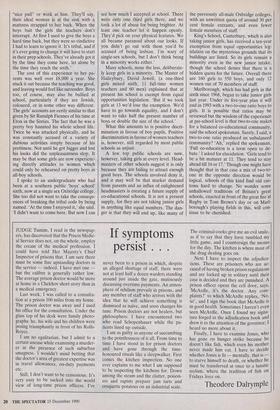If symptoms persist . . .
JUDGE Tumim, I read in the newspap- ers, has discovered that the Prison Medic- al Service does not, on the whole, employ the cream of the medical profession. I could have told Her Majesty's Chief Inspector of prisons that. I am sure there must be some fine upstanding doctors in the service — indeed, I have met one — but the calibre is generally rather low. The average prison doctor would be more at home in a Chekhov short story than in a medical emergency.
Last week, I was called to a consulta- tion at a prison 100 miles from my home. The prison doctor was away and I used his office for the consultation. Under the glass top of his desk were family photo- graphs: he, his wife and his children were posing triumphantly in front of his Rolls- Royce.
I am no egalitarian, but I admit to a certain unease while examining a murder- er in the presence of such suburban smugness. I wouldn't mind betting that the doctor's area of greatest expertise was in travel allowances, on-duty payments etc.
Still, I don't want to be censorious. It's very easy to be sucked into the world view of long-time prison officers. I've never been to a prison in which, despite an alleged shortage of staff, there were not at least half a dozen warders standing around just inside the gate, mutinously discussing overtime payments. An atmos- phere of nihilism prevails in prisons, and any member of staff who arrives with the idea that he will achieve something is dismissed as naïve, and soon changes his tune. Prison doctors are not healers, but philosophers: I have encountered two who read Schopenhauer while the pa- tients lined up outside.
I am as guilty as anyone of succumbing to the pointlessness of it all. From time to time I have stood in for prison doctors and have gone through the time- honoured rituals like a sleepwalker. First comes the kitchen inspection. No one ever explains to me what I am supposed to be inspecting the kitchens for. Down among the steam and the clatter, poison- ers and rapists prepare jam tarts and croquette potatoes on an industrial scale. The criminal-cooks give me an evil smile, as if to say that they have rumbled my little game, and I countersign the menus for the day. The kitchen is where most of the drug dealing goes on.
Next I have to inspect the adjudica- tions. These are prisoners who are ac- cused of having broken prison regulations and are locked up in solitary until their case is decided and they are punished. A prison officer opens the cell door, says, `McArdle, it's the doctor. Any com- plaints?' to which McArdle replies, 'No, sir', and I sign the book that McArdle is in good health. Sometimes I haven't even seen McArdle. Once I found my signa- ture forged in the adjudication book and drew it to the attention of the governor; I heard no more about it.
Finally, I have to examine Jones, who has gone on hunger strike because he doesn't like fish, which even his mother never made him eat. I have to decide whether Jones is fit — mentally, that is — to starve himself to death, or whether he must be transferred at once to a lunatic asylum, where the tradition of fish on Fridays lives on.
Theodore Dalrymple


























































 Previous page
Previous page